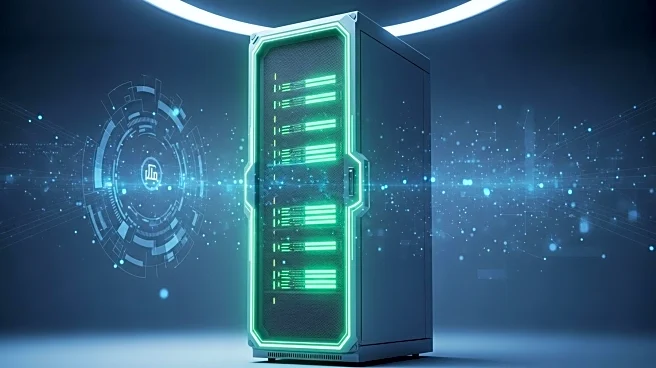What's Happening?
Nvidia has initiated the shipment of its DGX Spark mini supercomputers, with the first unit delivered to Elon Musk at the SpaceX facility. Nvidia's CEO Jensen Huang personally handed over the DGX Spark, which is built with Grace Blackwell silicon, featuring a GB10 chip with a one petaFLOP Blackwell GPU and a Grace CPU with 20 Arm cores. The device includes 128 GB of LPDDR5X unified memory and up to 4 TB of NVMe storage. Despite the launch, industry skepticism persists regarding the GB10 chip due to its delayed release, with some experts labeling the launch as a 'PR stunt'. Nvidia's strategy appears to involve distributing limited units to media outlets to simulate production readiness.
Why It's Important?
The delivery of the DGX Spark to SpaceX signifies Nvidia's push into the AI supercomputer market, potentially transforming desktop computing into an AI launchpad. This development could impact various sectors, including technology and space exploration, by providing advanced computational capabilities. However, skepticism about the GB10 chip's delays and limited distribution raises questions about Nvidia's production strategy and the actual readiness of the technology. If successful, the DGX Spark could enhance AI research and development, benefiting companies and researchers who require high-performance computing solutions.
What's Next?
Nvidia plans to continue distributing DGX Spark units to early recipients for testing and optimization. Major computer manufacturers like Acer, ASUS, Dell Technologies, GIGABYTE, HP, Lenovo, and MSI are expected to roll out systems incorporating the DGX Spark, potentially transforming desktops into AI platforms. The industry will be watching closely to see if Nvidia can overcome skepticism and deliver on its promises of high-performance AI computing. The outcome could influence future collaborations between tech companies and space exploration initiatives.
Beyond the Headlines
The launch of the DGX Spark raises ethical considerations about the transparency of tech launches and the potential for companies to use media strategies to mask production issues. The skepticism surrounding Nvidia's approach highlights the importance of accountability and honesty in technological advancements. Long-term, successful deployment of the DGX Spark could lead to significant shifts in AI capabilities, influencing sectors beyond technology, including healthcare, finance, and education.









